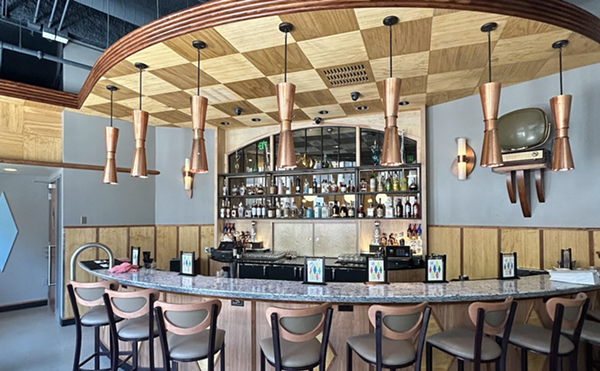Here we go again at 325 W. Fourth St. in Royal Oak. Like the apparently jinxed restaurant venues on Woodward south of 14 Mile Road and the one at the intersection of Orchard Lake and Pontiac Trail, the large storefront that wraps around the busy corner opposite Sangria and near the Royal Oak Music Theatre has witnessed the rapid rise and fall of several eateries over the past few years. Ronin, the new Japanese restaurant that opened in mid-August, may have just the right stuff to break the jinx.
In the first place, the space has been aesthetically reconfigured, beginning with the entrance, which flaunts two parallel rows of graceful bamboo trees. Inside, the handsome, dimly lit dining and lounge areas can seat 125; they're marked by dramatic wooden pillars, red-cedar walls and twig arrangements suspended from the high ceilings, all of which help create the mellow ambience of a Japanese teahouse.
The owners, James Hayosh and Hubert Yaro, recruited Kaku Usui (formerly of downtown Detroit's Oslo) to handle the sushi bar and Matthew Dalton from the Townsend and Fiddleheads to deal with the other fare. Yaro had been in the music business, Hayosh owned a successful sushi-bar chain in Arizona.
If the name Ronin, which means masterless samurai, sounds familiar, it was the title of a 1998 thriller starring Robert De Niro and a gang of independent samurai. But the only violence here involves the vigorous chopping and slicing at the sushi bar, where Usui and his bandana-clad accomplices turn out first-rate sushi and sashimi.
The sushi maven at our table one night pronounced his sampling — bonita negiri, spicy scallops and a seaweed-wrapped California eel roll — to be fresh and expertly prepared. Sushi averages around $5 a dish, sashimi around $10.
Although sushi is what draws many patrons to Ronin, it remains an acquired taste for others, despite its relative ubiquity in most urban centers as well as at weddings and bar mitzvahs. Consequently, Dalton has constructed an interesting limited array of other Japanese standards that should keep those nervous about eating raw fish sated.
At the top of the list of 16 appetizers, soups and salads is albacore tataki, briefly seared delicate slices of tuna centered around a mound of radish daikon. At $12, this may be a bit steep for a few dreamy chopstickfuls, but that is the price one pays for sushi-grade albacore these days. The ultra-light sweet-potato tempura, with a dipping sauce of bonita stock, ginger and soy sauce, is more economical ($4) if less elegant.
Unlike Chinese, Korean and Vietnamese cuisine, Japanese cuisine tends to emphasize a simplicity and purity that may strike some diners as a seasoning deficiency. For them, there is always fiery wasabi to enliven a dish.
As for greenery, the house salad is crisp if unremarkable. Instead opt for the construct-it-yourself lettuce wraps with the vegetarian variant composed of taro and mushroom tidbits in a slightly assertive mushroom soy sauce likely to please even carnivores. A gentler first is a subtly seasoned and only lightly salted traditional miso soup made from soybean paste and laden with tofu, seaweed and scallions. Other starters include pork gyoza (potstickers), chicken yakitori and a king wasabi Caesar salad.
Ronin offers only 5 entrées ($11-$28) but with noodles, fish, fowl and beef, most gastronomic bases are covered. The chilled green-tea noodles in lemongrass oil, an uncharacteristically hefty portion compared to other preparations that seem lonely in their oversize white tableware, satisfy in texture but are a bit bland — as they're meant to be.
The chunk of salmon flavored with Asian cherry barbecue sauce over crunchy risotto, served with a mushroom mélange, was pleasingly crisp on the outside, moist and flaky inside. The even crunchier black risotto served as a wonderful counterpoint to the four meaty diver scallops that topped it. A chicken fillet and organic chicken teriyaki round out the entrées, which are supplemented with two sandwiches, a king-crab club and sliders filled, somewhat incongruously, with Kobe beef ($21).
Of the 20-odd beers available, nine are on tap, including Kirin Ichiban. Not surprisingly, the bar is well stocked with sake, along with an intelligently selected group of 10 bottles of wine, four of which cost between $20 and $28.
In keeping with the rest of the spare menu, aside from the abundant sushi offerings, Ronin features only four desserts. The refreshing green-tea ice cream ($3) is a healthy way to end the meal but so too is the imaginatively presented gluten-free dark and white chocolate cake. Throughout the courses at Rodin, it is clear that a good deal of thought has gone into the way the food is presented, which, of course, is the Japanese way.
The key question is will this welcome new entry to the Royal Oak restaurant scene be able to transcend the curse that some angry chef may have placed on the building on the north corner of Lafayette and Fourth. Open only for dinner with its choice but spare menu and no-reservation policy, Ronin faces problems, aside from our local economy. Nonetheless, the stylish Japanese restaurant deserves to be a keeper.
Mel Small teaches history at Wayne State University. Send comments to [email protected].





